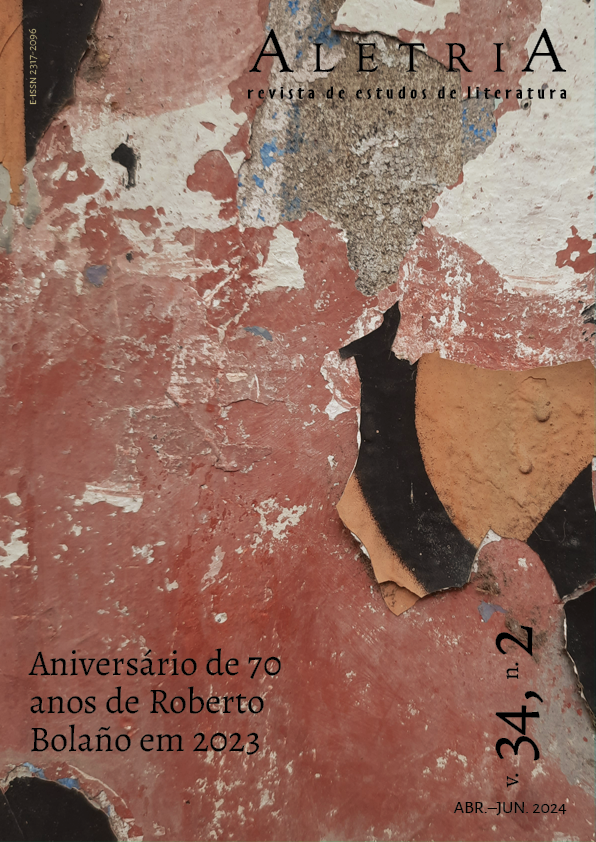Memories of a Feverish Night
Ghosts from an Omitted Dictatorship in Nocturno en Chile, by Roberto Bolaño
Keywords:
dictatorship, Chile, Bolaño, memory, testimony, omissionAbstract
This article highlights, in Nocturno en Chile, by Roberto Bolaño, the concept of astonishing ridiculousness and how it undermines the memory and the testimony when they are fundamental in a dictatorial scenario. The novel is a manner to review the past, new possibilities of interpretation of history as well as a provocation to the present time, reminding the permanence of daily omissions. While the ridiculousness refers to the duplicity (an omissive man of letters besides violences of State), the astonishing refers to a background of horror, marked by deaths, tortures and disappearing of people. For this analysis, we employ, as theoretical base, Grínor Rojo (2016). His ideas explain the concept of “astonishing ridiculousness”. Considering the idea of objectivity in history, we observe Nietzsche (1983) and Jacques Le Goff (2003). Lastly, refiring to the memory and testimony, we use Seligmann-Silva (2003), Jeanne Marie Gagnebin (2006), Beatriz Sarlo (2007) and Todorov (2008).
Downloads
References
ALLENDE, Isabel. La casa de los espíritus. 7. ed. Buenos Aires: Debolsillo, 2006.
BOLAÑO, Roberto. Nocturno en Chile. Barcelona: Anagrama, 2000.
FRANCO, Renato. Literatura e Catástrofe no Brasil: anos 1970. In: SELIGMANN-SILVA, Márcio. História, memória, literatura: o testemunho na era das catástrofes. Campinas: Editora da Unicamp, 2003. p. 351-369.
GAGNEBIN, Jeanne Marie. Lembrar escrever esquecer. São Paulo: Ed. 34, 2006.
LE GOFF, Jacques. A história nova. Tradução de Eduardo Brandão. São Paulo: Martins Fontes, 2005.
MENDES, Ricardo A. S. 40 Anos do 11 de Setembro: o golpe militar no chile. Revista Estudos Políticos, n. 7, p. 172-190, 2013.
MUÑOZ, Heraldo. A sombra do ditador: memórias políticas do Chile sob Pinochet. Tradução de Renato Aguiar. Rio de Janeiro: Zahar, 2010.
NIETZSCHE, Friedrich Wilhelm. Da utilidade e desvantagem da história para a vida. In: Obras incompletas. Seleção de textos de Gérard Lebrun. Tradução e notas de Rubens Rodrigues Torres Filho. Posfácio de Antônio Candido. 3. ed. São Paulo: Abril Cultural, 1983. p. 273-287. (Coleção Os Pensadores).
RICŒUR, Paul. A memória, a história, o esquecimento. Tradução de Alain François et al. Campinas: Editora da Unicamp, 2007.
PALADINO, Luiza Mader. O exílio chileno de Mário Pedrosa: solidariedade, arte popular e vocação comunitária. MODOS: Revista de História da Arte, Campinas, São Paulo, v. 5, n. 1, p. 14-31, 2021. DOI: 1020396/modos.v5i1.8663905. Disponível em: https:// periodicos.sbu.unicamp.br/ojs/index.php/mod/article/view/8663905. Acesso em: 22 dez. 2022.
RIBEIRO, Darcy. As Américas e a civilização: processo de formação e causas do desenvolvimento desigual dos povos americanos. São Paulo: Companhia das Letras, 2007.
ROJO, Grínor. Las novelas de la dictadura y la postictadura chilena: quince ensayos críticos. Santiago: LOM ediciones, 2016.
SARLO, Beatriz. Tempo passado: cultura da memória e guinada subjetiva. Tradução de Rosa Freire D’Aguiar. São Paulo: Companhia das Letras; Belo Horizonte: UFMG, 2007.
SCHWARCZ, Lilia Moritz. Sobre o autoritarismo brasileiro. São Paulo: Companhia das Letras, 2019.
SELIGMANN-SILVA, Márcio. História, memória, literatura: o testemunho na era das catástrofes. Campinas: Editora Unicamp, 2003.
SIMÕES, Silvia Sônia. O golpe de Estado e a primeira fase da Ditadura militar no Chile. Espaço Plural, v. XIII, n. 27, p. 195-213, 2012. Disponível em: http://www.redalyc.org/articulo.oa?id=445944369014. Acesso em: 21 set. 2022.
TODOROV, Tzvetan. Los abusos de la memoria. Tradução de Miguel Salazar. Barcelona: Ediciones Paidós, 2008.
Downloads
Published
How to Cite
Issue
Section
License
Copyright (c) 2024 Evandro Figueiredo Candido (Autor)

This work is licensed under a Creative Commons Attribution 4.0 International License.
Authors who publish with this journal agree to the following terms:Authors retain copyright and grant the journal right of first publication with the work simultaneously licensed under a Creative Commons Attribution Non-Commercial No Derivatives License that allows others to share the work with an acknowledgement of the work's authorship and initial publication in this journal.Authors are able to enter into separate, additional contractual arrangements for the non-exclusive distribution of the journal's published version of the work (e.g., post it to an institutional repository or publish it in a book), with an acknowledgement of its initial publication in this journal.Authors are permitted and encouraged to post their work online (e.g., in institutional repositories or on their website) prior to and during the submission process, as it can lead to productive exchanges, as well as earlier and greater citation of published work (See The Effect of Open Access).





